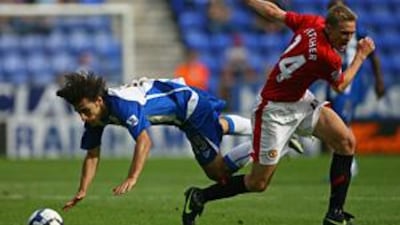"I learned much more from defeat than I ever learned from winning." It is a sporting truism and one with which Sir Alex Ferguson may concur. Defeat is an occupational hazard for most teams and, in the eyes of many onlookers, a calamity for Manchester United. Schadenfreude is easy to identify in the aftermath; what is more instructive, however, is Ferguson's response.
United's reaction, in Saturday's 5-0 win at Wigan, was an emphatic rejoinder to predictions of their decline. Startled and subdued at Burnley last Wednesday, a second meek surrender was not an option. Examine Ferguson's decision-making, however, for a match that already assumed pivotal importance and it is revealing where his trust lies. Wayne Rooney scored two goals, including his 100th for the club, but one man was handed a still greater responsibility. For the first time this season, Ferguson fielded two out-and-out wingers, Nani and Antonio Valencia, in an ever-changing midfield. They were separated by the recalled pair of Paul Scholes and Darren Fletcher.
The veteran has many merits, but tackling was never one and, increasingly, neither is mobility. Factor in Wigan's formation, meaning that the duo were outnumbered by three central midfielders, and it merely added to Fletcher's task. It included shielding the back four and accelerating past Scholes to become the midfielder who supported the strikers, ensuring United dominated possession in a sphere of the game where Wigan possessed more players and retrieving possession whenever the champions lost it. In effect, Ferguson trusted Fletcher with providing United with a platform from which they could attack.
His fellow Scot certainly did that. No United player touched the ball more often at the DW Stadium, none passed it as frequently. None, with the exception of Rooney, made as great a contribution to victory. So is it time Fletcher received proper recognition? There was an outpouring of sympathy for him when he was wrongly suspended for the Champions League final. But it was underpinned by the thought that it would be his only opportunity to play on that stage.
If he is United's premier central midfielder, that does not become a once-in-a-lifetime chance. Yet swift progress has gone unacknowledged. Fifteen months ago, he ranked as Ferguson's fifth option behind Scholes, Michael Carrick, Owen Hargreaves and Anderson. Five years ago, he appeared one of "Fergie's Follies", a group of midfielders that incorporated Liam Miller, Kleberson and Eric Djemba-Djemba, all of whom appeared unworthy to partner Roy Keane. Now, minus the charisma and the controversy, he is the closest equivalent to Keane in the current team, in position if not personality. An essentially unassuming and unselfish player with the stamina, work ethic and ability to knit a team together, he has quietly become integral to the side.
When the season started, there may have only been four men in his squad Ferguson considered automatic choices: Rooney, Patrice Evra, Rio Ferdinand and Nemanja Vidic. There may be a fifth player in that category now, especially, like Saturday, for games United need to win. Once the notion of Darren Fletcher's being the first name on a Manchester United teamsheet would have appeared laughable. Now it seems eminently sensible.
See a graph of Carlton Cole's passing on Sunday and a couple of things are evident. The West Ham striker mainly deals in short passes, often to Mark Noble. Yet among the five- and 10-yard balls, there is an anomaly: the 20-yard back-pass he guided perfectly into the path of Tottenham's Jermain Defoe for his rasping equaliser. In one, inexplicable, moment, Cole undid all his excellent work when he outmuscled the Tottenham defence before scoring a glorious half-volley. It is only the first week of the season, but it is unlikely there will be a stranger piece of distribution in the next nine months. If there is, however, Cole will be relieved.
If strikers determine the fortunes of their team, and there are many who believe they do, they acquire a still greater significance in struggling sides where fewer of their team-mates are potential goalscorers. No wonder, then, that they command the majority of the attention and occupy much of the transfer budget. Saturday marked the bow of two imported forwards. Hull introduced Jozy Altidore and, after 28 seconds and one improvised pass from the American, Kamel Ghilas scored the only goal against Bolton.
Blackburn brought on Nikola Kalinic at Sunderland. In his quest for an equaliser, the Croatian had three shots, one scuffed and two merely misplaced, that occupied the ball boys but not the goalkeeper and his side lost 2-1. They were striking debuts, in every sense of the phrase, but while the Hull crowd are already acclaiming the man who, unsurprisingly, had been dubbed their American idol, Blackburn must hope it is not a sign of things to come.
Saturday was the 234th day of 2009. It was also the first when Hull won a Premier League game at the KC Stadium, and just the second when they won one anywhere. In the circumstances, Bolton's dominance of both possession and chances in the first hour matters little. Never mind the performance, enjoy the result. Richard Jolly is an authority on the English game and has written about all four professional divisions for, among others, The Guardian and The Sunday Telegraph
rjolly@thenational.ae


